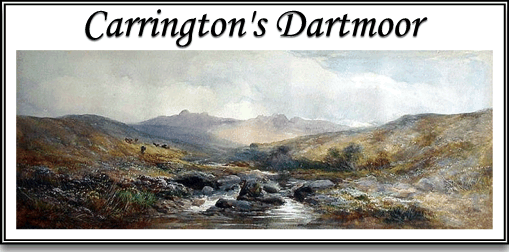
Noel Thomas Carrington, son of a Plymouth grocer was born in 1777. His first job was working in the Royal Dockyard in Plymouth where he remained for 4 years after which he absconded to sea. During he sea faring days he served in a battle of Cape Finisterre in 1797. This experience led him to pen his first verses of poetry, an action which when his Captain read the work earned him his liberty. In 1804, Carrington became a teacher at a school in the Kent town of Maidstone and the 2 years later, in 1809, he returned to Plymouth Dock where he continued his teaching career. Whilst at the Dock, in 1826 he wrote one of his best known poems, “Dartmoor.” A short while afterwards he came down with consumption and moved to Bath where he died on the 2nd of September 1830. He was buried at a small church in Combe Hay which is just outside the town of Bath.
DARTMOOR
Dartmoor! thou wert to me, in childhood’s hour,
A wild and wondrous region. Day by day
Arose upon my youthful eye they belt
Of hills mysterious, shadowy, clasping all
The green and cheerful landscape sweetly spread
Around my home; and with a stern delight
I gazed upon thee. How often on the speech
Of the half-savage peasant have I hung,
To hear of rock-crowned heights on which the cloud
For ever rests; and wilds stupendous swept
By mightiest storms; of glen, and gorge, and cliff,
Terrific, beetling o’er the stone-strewed vale;
And giant masses, by the midnight flash
Struck from the mountain’s hissing brow, and hurled
Into the foaming torrent; and of forms
That rose amid the desert, rudely shaped
By Superstition’s hands when time was young;
And of the dead, the warrior dead, who sleep
Beneath the hollowed cairn! My native fields,
Though peerless, ceased to please. The flowery vale,
The breezy hill, the river and the wood,
Island, reef, headland, and the circling sea,
Associated by the sportful hand
Of Nature, in a thousand views diverse,
Or grand, or lovely, – to my roving eye
Displayed in vain their infinite of charms;
I thought on thy wild world, – to me a world, –
Mysterious Dartmoor, dimly seen, and prized
For being distant and untrod; and still
Where’er I wander’d, – still my wayward eye
Rested on thee!
In sunlight and in shade,
Repose and storm, wide waste! I since have trod
Thy hill and dale magnificent. Again
I seek thy solitudes profound, in this
Thy hour of deep tranquillity, when rests
The sunbeam on thee, and thy desert seems
To sleep in the unwonted brightness, calm,
But stern; for though the spirit of the Spring
Breathes on thee, to the charmer’s whisper kind
Thou listenest not, nor ever puttest on
A robe of beauty, as the fields that bud
And blossom hear thee. Yet I love to tread
They central wastes when not a sound intrudes
Upon the ear, but rush of wing or leap
Of the hoarse waterfall. And oh, ’tis sweet
To list the music of thy torrent-streams;
For thou too hast thy minstrelsies fro him
Who from their liberal mountain-urn delights
To trace thy waters, as from source to sea
They rush tumultuous. Yet for other fields
Thy bounty flows eternal. From thy sides
Devonia’s rivers flow; a thousand brooks
Roll o’er they rugged slopes; -’tis but to cheer
Yon Austral meads unrivalled, fair as aught
That bards have sung, or Fancy has conceived
‘Mid all her rich imaginings: whilst thou,
The source of half their beauty, wearest still
Through centuries, upon they blasted brow,
The curse of barrenness.
In October 1834 The Times reported that:
“A hitherto unrecorded instance of the patronage which George IV, occasionally afforded to genius has just come forth in the memoir of the late N. T. Carrington, the author of the poem of Dartmoor. When it first appeared, in 1826, the monarch ordered his opinion of the poem to be transmitted to the author in the shape of a present of 50 guineas.”
That in modern day terms would represent a sum of about £3,250, not bad for a day’s work. Noel Carrington has two commemorations on Dartmoor, one is the topmost rock of the summit of the Dewerstone when the name, ‘Carrington’ has been incised.
 Legendary Dartmoor The many aspects past and present of Dartmoor
Legendary Dartmoor The many aspects past and present of Dartmoor


Dear Legendary Dartmoor,
I am at present preparing for a presentation part of which involves a few verses from Noel Carrington’s poems ‘Dartmoor’ and ‘The Banks of Tamar’, both of which are wonderful poems. I would like to know where you have obtained the information about Mr Carrington being giving 50 guineas from George the IV.
I was under the impression that according to ‘Dartmoor, a descriptive poem’, part of the Bibliotheca Bodleiana, In a note I understand to be writting by Mr H. E. Carrington, The eldest son of the author;
‘The Royal Society of Literature offered a Premium of Fifty Guineas for the best poetical effusion on Dartmoor; and this sum was awarded to Mrs. Hermans, for her truly beautiful lines on that subject.’
Knowing how well acquainted Mr Nicholas (Noel) Toms Carrington was with various notables and nobles of the day. Did the king at some point also pay Mr Carrington a similar sum of 50 guineas for his poem as a mark of his personal opinion? Would you have any informations that I could quote in my academic paper to this being the case. I am making this enquiry as the date of the original commission won by Mrs Hermans is the same year? It may be that both poems were entered for the same award?
I hope you are able to help clarify this for my further studies and thank you in advance for the information that you have supplied about Mr Carrington and his final resting place. These are things that would have taken me a long time to discover. I have found it fascinating to discover the Mr N.T. Carrington is known as Nicholas or Noel and Toms or Thomas Carrington.
Thank you for any and all the help you are able to give me.